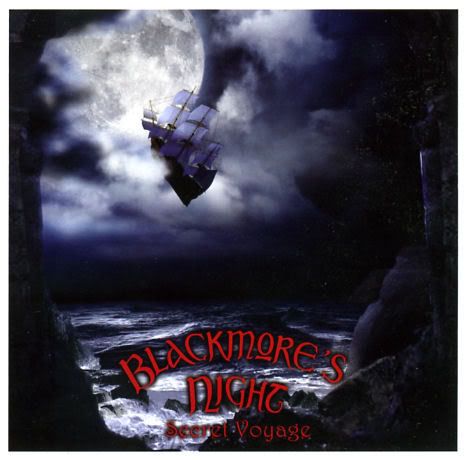
Now the music press has been rather unkind to Ritchie Blackmore in recent years. He's been portrayed as a nutter who has forsaken his once-beloved Fender Stratocaster and has taken to prancing around dressed up as a court jester whilst playing the lute.
With this imagery in mind I approached this latest release from Blackmore's Night with caution. I really wasn't sure quite what to expect or what I'd make of it. I was prepared to be confused and dumbfounded.
I don't know what I was worried about. I loved it.
Now to start with, let me say that the cover art could have been straight from a Rainbow LP! So, no change there then.
Onto the music... The album opener, the instrumental "God Save The Keg", is a pompous overture if I've ever heard one! It erroneously and worryingly hints that it's going to be an album of progressive rock, but despite this it's good fun all the same.
Next we're neatly segued into "Locked Within The Crystal Ball" which begins serenely with with monks chanting, but soon a galloping beat deveops and we're off. Now Blackmore's Night isn't just Ritchie Blackmore's baby. It's a joint project with singer Candice Night (see how they got both their names into the band name? Clever, eh?) and she has the voice of an angel. The song fairly gallops along and has oodles of Blackmore's trademark guitar and what sounds like a hurdy gurdy and a harp. It's very poppy and radio-friendly despite being a whole eight minutes long.
"Gilded Cage", a folky ballad, slows the pace down with acoustic guitars and a violin solo, and is followed by "Toast To Tomorrow" which begins with a hammer-dulcimer intro, and then fiddles, accordions and mandolins(?) start up in what could be a Grecian or Russian dance. Listening to it you can just imagine the cossack dancers. It's a triumphant track!
The pace slows once again for Ritchie's solo piece, "Prince Waldeck's Galliard", renaissance-style acoustic guitar with birds tweeting in the background. It sounds naff when I put it like that, but is quite lovely.
On "Rainbow Eyes" Blackmore cheekily covers himself, as this song was originally by a certain band called Rainbow. It's a ballad with some gorgeous slide electric guitar from Blackmore.
"The Circle" is medium-paced folk rock with a slight mediterranean flavour. There's more slide guitar and an electric solo during the rising crescendo at the song's finish.
"Sister Gypsy" is a medieval sounding folk song with guitar (or lute?), fiddle and basic percussion. It's simple but very effective and beautiful.
Now when I heard the opening bars of "Can't Help Falling In Love" - Yes, the Elvis song - at first I thought "WHY?" but then I found myself quite enjoying it. Again we have the galloping rhythm from "Crystal Ball". Oh, and a widdly solo!
"Peasant's Promise" opens with some more lute-esque renaissance guitar. Then the beat of a bodhran-style drum comes in and we get a renaissance folk dance with pipes and/or recorders(?). It's quite hypnotic.
"Far Far Away" is a much more up-to-date sounding folky ballad in 3/4. It's still an excellent song, with accomplished playing and singing but somehow, for me, is not as enjoyble as the other tracks.
Finally, we have "Empty Words", a brief track with begins with a lone acoustic guitar, which is then joined by Candice Night's vocal, and gradually strings come in as further accompaniment. It possibly ends the album on a downbeat. When I first listened to this album I was playing it on my iPod in the office, and I inadvertantly had "shuffle" selected so that after the first track, all the following songs were in the wrong order. On that occasion the album finished with "Locked Within The Crystal Ball" which, I thought, was an excellent way in which to finish the album - on a high note and leaving the audience wanting more!
All in all, I think this is a fantastic album and I would give it a full 5 out of 5. Now Ritchie Blackmore has over the years earned himself the reputation of being - how shall we say? - a moody git, and I always felt that he was never happy in Deep Purple or Rainbow. Somehow, through the medium of this music of Blackmore's Night, I get the impression he's now doing what he really wants to do and that it makes him happy. And you can only wish him the best of luck in that, can't you?
Now I must apologise for not saying much about Candice Night throughout this review. I confess I know very little about her. She has what I like to call an "English folk-singing voice" (and that is not meant in any detrimental way) and I hope it's sufficient to say that her voice is equally suited to the folk, medieval and rock tracks on offer here. I'd say that she was the perfect vocal foil to Blackmore's guitar. I hope that their relationship continues to be a harmonious and happy one.
Buy it here!

No comments:
Post a Comment